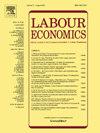The short- and long-term effects of family-friendly policies on mothers’ employment
IF 2.6
2区 经济学
Q2 ECONOMICS
引用次数: 0
Abstract
Countries often encourage part-time work among new parents as part of their family policies, aiming to foster mothers' labor market attachment. However, this approach may unintentionally impede women's long-term career prospects. We examine the impact of a 1999 Spanish reform that allowed parents to reduce their working hours by up to a half while their youngest child was under age 6, along with job protection measures. Leveraging eligibility rules, we follow a regression kink design, comparing ineligible women to mothers who had varying lengths of eligibility, and tracking their subsequent work trajectories. Our findings show that longer eligibility led to a modest increase in maternal part-time work during her child's early years, with mothers working approximately one additional day part-time for each extra month of eligibility. This increase in part-time work substituted for days spent in unemployment rather than reducing full-time work, leading to a rise in earnings. In the long term, extended eligibility also led to improvements in both employment and earnings. Overall, we find that the policy had a positive impact on the labor supply and earnings of women with children, both in the short and long term.
家庭友好政策对母亲就业的短期和长期影响
作为家庭政策的一部分,各国经常鼓励初为父母的人从事兼职工作,目的是培养母亲对劳动力市场的依赖。然而,这种做法可能无意中阻碍了妇女的长期职业前景。我们研究了1999年西班牙改革的影响,该改革允许父母在最小的孩子不满6岁时减少最多一半的工作时间,并采取工作保护措施。利用资格规则,我们遵循回归扭结设计,将不合格的女性与具有不同资格长度的母亲进行比较,并跟踪她们随后的工作轨迹。我们的研究结果表明,资格延长导致母亲在孩子早期兼职工作的适度增加,母亲每延长一个月的资格,就多做一天兼职。兼职工作的增加取代了失业的天数,而不是减少了全职工作,从而导致收入的增加。从长远来看,延长资格也导致了就业和收入的改善。总体而言,我们发现该政策对有孩子的妇女的劳动力供给和收入产生了积极的影响,无论是短期还是长期。
本文章由计算机程序翻译,如有差异,请以英文原文为准。
求助全文
约1分钟内获得全文
求助全文
来源期刊

Labour Economics
ECONOMICS-
CiteScore
3.60
自引率
8.30%
发文量
142
期刊介绍:
Labour Economics is devoted to publishing research in the field of labour economics both on the microeconomic and on the macroeconomic level, in a balanced mix of theory, empirical testing and policy applications. It gives due recognition to analysis and explanation of institutional arrangements of national labour markets and the impact of these institutions on labour market outcomes.
 求助内容:
求助内容: 应助结果提醒方式:
应助结果提醒方式:


